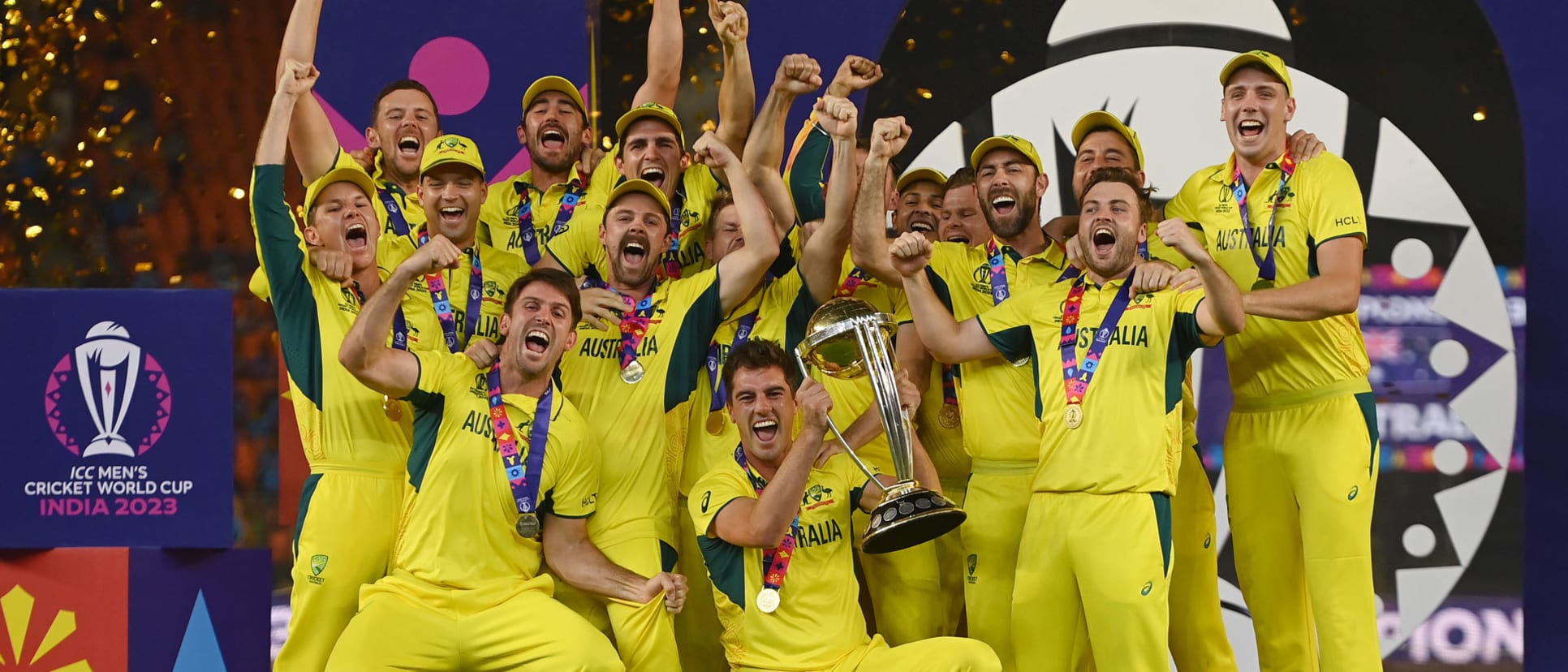Finalists dominate Cricket World Cup Team of the Tournament

South Africa’s opener was in breath-taking form during the group stage, scoring four centuries, including an enormous 174 against Bangladesh at the Wankhede Stadium.
Quinton de Kock scored 594 runs at a strike rate of 107.02 across the tournament, with only Indian pair Rohit Sharma and Virat Kohli scoring more.
The India captain and opener set the tone at the top of the order for the hosts, hitting 597 runs, with only his teammate Virat Kohli scoring more.
Rohit Sharma breaks multiple records with superb century | CWC23
Highlights of Rohit Sharma smashing a record-breaking hundred for India against Afghanistan at the ICC Men's Cricket World Cup 2023
Rohit’s tally is the seventh-highest ever at a men’s Cricket World Cup, 51 runs short of his own best effort at the 2019 tournament in England.
The nature of the opener’s runs was even more crucial than their volume, with his strike-rate of 125.94 being the highest of any top-four batter in the tournament. Only Glenn Maxwell and Heinrich Klassen scored at a quicker rate among the World Cup’s recognised specialist batters.
Every Rohit Sharma six at the ICC Men's Cricket World Cup | CWC23
Every Rohit Sharma six at the ICC Men's Cricket World Cup | CWC23
Virat Kohli produced an all-time great run of form, scoring the most runs ever by an individual batter at a men’s Cricket World Cup.
His 765 surpassed the previous record held by Sachin Tendulkar (673 in 2003) and came at an average of 96.62.
Only twice out of 11 innings did Kohli not reach at least a half century. And his three hundreds in the tournament saw him reach 50 career ODI tons, overtaking Tendulkar for the most in the history of the format.
New Zealand’s run to the semi-finals was built on the back of a mountain of runs, and Daryl Mitchell played a big part in that.
Daryl Mitchell's hits career-best 130 in Dharamsala | CWC23
Daryl Mitchell hit nine fours and five sixes during his knock against India in the ICC Men's Cricket World Cup 2023.
His 552 runs in nine innings came at an average of 69 and strike-rate of 111.06, and showcased his great versatility – building platforms at times and upping the scoring rate at others.
His 134 in a losing cause in the semi-final against India was a brave effort when his team needed it most.

The India right-hander was a model of consistency for his side throughout the world Cup as he amassed a decent total of 452 runs from 10 hits.
Rahul impressed mainly during the middle overs, scoring a tournament best 102 against the Netherlands in Bengaluru and contributing an even better innings of 97* against Australia at the start of the event.
The 31-year-old finished the World Cup with a superb average of 75.33, which was the third best overall for any batter during the tournament.
KL Rahul dines out on Australia with match-winning knock | POTM Highlights
Player of the match highlights as KL Rahul amassed an unbeaten 97 to steer India to victory against Australia at the ICC Men's Cricket World Cup 2023
The Big Show provided two all-time moments with the bat. His century against the Netherlands was the fastest ever seen at a Men’s Cricket World Cup, coming off just 40 balls.
But his effort against Afghanistan was even more extraordinary.
With Australia requiring 292 and slipping to 91/7, Maxwell produced arguably the greatest individual innings of all-time, scoring 201* from 128 balls as he battled pressure, Afghanistan’s spinners and crippling cramp to get his team across the line.
India’s spin-bowling all-rounder played a crucial role for his team, taking key wickets throughout the middle overs and consistently turning the screw.
Jadeja rips one past Bavuma | CWC23
Ravindra Jadeja cleaned up the South Africa skipper for 11.
His economy rate was among the best in the tournament, going for 4.25 per over as he brilliantly backed up the new-ball attack.
With the bat he played an important role at number seven too, scoring 120 runs in his five appearances in the middle.
The leader of India’s attack, Jasprit Bumrah was relentless in his excellence.
While being a threat in all sections of the innings, it was Bumrah’s new-ball brilliance that made the biggest impact for his team.
'Once in a generation' Bumrah on returning to his best for India | CWC23
Jasprit Bumrah has made an immediate impact on his return to the India side after overcoming a back injury in time for the ICC Men's Cricket World Cup 2023
He took wickets throughout the tournament, and proved extremely difficult to get away.
No bowler to have played more than a single game in the tournament was able to return a better economy rate than Bumrah’s 4.06 – an even more remarkable stat considering he was so often in action when the fielding restrictions were in place.
Sri Lanka’s left-arm speedster Dilshan Madushanka was a revelation.
Madushanka strikes big to remove Rohit | CWC23
Dilshan Madushanka had the India skipper bowled off the very second ball of the game.
His 21 wickets put him firmly in the tournament’s top five wicket-takers, and he was a relentless threat with the new ball.
Madushanka double strike jolts India | CWC23
Dilshan Madushanka accounted for the set Shubman Gill (92) and Virat Kohli (88) at the ICC Men's Cricket World Cup 2023.
A haul of 5/80 against India was the pick of his efforts.
Australia’s leading wicket-taker in the tournament, Adam Zampa equalled Muttiah Muralidaran for most wickets by a spinner in a single Men’s Cricket World Cup.
Inspired Zampa steers Australia to victory | POTM Highlights | CWC23
Adam Zampa played a crucial all-round role in Australia's win over England at the ICC Men's Cricket World Cup 2023.
His 23 wickets came at an average of 22.39, and he took three consecutive four-wicket hauls in the league stage, including a remarkable spell of 4/8 against the Netherlands.
Only Mohammed Shami took more wickets in the tournament than the Aussie leg-spinner.
And Zampa’s lower-order 29 against England ended up being pivotal in a match that put Australia in control of their progression to the semi-finals.
The tournament’s top wicket-taker, Mohammed Shami was simply extraordinary for a team that he wasn’t even a part of at the start of the campaign.
Shami sat out his team’s first four matches, but was remarkable from thereon in, taking 24 wickets at an average of just 10.70 and 5.26.
Only four players in the history of the men’s game have taken more Cricket World Cup wickets than Shami's 55 – Lasith Malinga (56) Mitchell Starc (65), Muttiah Muralitharan (68) and Glenn McGrath (71) – with Shami’s returns coming in ten fewer matches than any of those above him in the list.
South Africa needed a spark in their attack in the absence of Anrich Nortje, and found it in young Gerald Coetzee.
He bowled with pace and threat throughout the campaign, taking 20 wickets across his eight matches.
The 23-year-old finished with an average of 19.80 and economy of 6.23.
Coetzee shines with career-best effort | CWC23
Gerald Coetzee picked 4/44 in Ahmedabad.